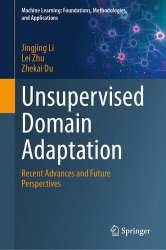Unsupervised Domain Adaptation: Recent Advances and Future Perspectives
- Добавил: literator
- Дата: 23-04-2024, 17:50
- Комментариев: 0
 Название: Unsupervised Domain Adaptation: Recent Advances and Future Perspectives
Название: Unsupervised Domain Adaptation: Recent Advances and Future PerspectivesАвтор: Jingjing Li, Lei Zhu, Zhekai Du
Издательство: Springer
Серия: Machine Learning: Foundations, Methodologies, and Applications
Год: 2024
Страниц: 234
Язык: английский
Формат: pdf (true), epub
Размер: 37.8 MB
Unsupervised domain adaptation (UDA) is a challenging problem in Machine Learning where the model is trained on a source domain with labeled data and tested on a target domain with unlabeled data. In recent years, UDA has received significant attention from the research community due to its applicability in various real-world scenarios. This book provides a comprehensive review of state-of-the-art UDA methods and explores new variants of UDA that have the potential to advance the field.
Domain adaptation refers to the Machine Learning techniques that enable models trained on data from a source domain to perform well on a different but related target domain. This chapter provides the necessary background on transfer learning and its relationship to domain adaptation. We define the domain adaptation problem and discuss the categorization of domain adaptation techniques into supervised, semi-supervised, and unsupervised paradigms. The rest of the book will focus specifically on unsupervised domain adaptation. We motivate the need for unsupervised domain adaptation, discuss its advantages over other paradigms, and provide a high-level overview of the common approaches and techniques.
The remarkable success of Deep Learning in the last decade has been largely driven by the availability of extensive labeled training data. However, most existing labeled datasets are designed for specific tasks, making it challenging for models trained on them to generalize to novel scenarios with limited or no labeled data. Domain adaptation techniques help address this challenge by transferring knowledge learned from data-rich source domains to data-scarce target domains. Specifically, unsupervised domain adaptation, where no labeled data is available in the target domain, remains an open and critical challenge.
The rise of Deep Learning has led to remarkable breakthroughs in fields like Computer Vision (CV), natural language processing (NLP), and speech recognition. However, a key prerequisite for deep learning is the availability of adequate labeled data, which are often tedious and expensive to collect. As deep learning advance to more complex scenarios, models trained on one dataset often fail to generalize well to new datasets, even within the same task domain. This is due to the violation of the basic assumption of machine learning that training data and test data are independent and identically distributed (i.i.d.). Once distribution shift occurs, it necessitates collecting a sufficient amount of data to retrain the model. Consequently, training universal models that can span various domains is quite challenging in practice.
This book offers a comprehensive introduction of recent breakthroughs in unsupervised domain adaptation and discusses opportunities for future advancement. It covers key techniques spanning statistical alignment, adversarial learning, source-free domain adaptation, active domain adaptation, and continual test-time adaptation. For each sub-field, the book not only offers a systematic review of latest advancements but also provides in-depth analysis of limitations of existing methods.
To overcome identified limitations, this book introduces several novel domain adaptation methods with elaborate methodological design and extensive empirical evaluation on benchmarks. Beyond methodology, it highlights impactful applications in visual recognition, object detection, semantic segmentation, and other domains. The book concludes by summarizing open problems and outlining promising new frontiers for high-impact innovation.
The authors of this book have made significant research contributions to domain adaptation and related topics. This book summarizes their latest advances in unsupervised domain adaptation. The extensive technical coverage offers both consolidating perspectives on fundamental theory as well as exposure to latest advancements driving progress in the field. It is our hope that this book can serve as an accessible guide for new researchers as well as an insightful reference for experienced academics pursuing advancements in this rapidly evolving field. The passion and insights gathered here may seed innovative ideas that lead to breakthroughs in unsupervised domain adaptation.
Скачать Unsupervised Domain Adaptation: Recent Advances and Future Perspectives
Внимание
Уважаемый посетитель, Вы зашли на сайт как незарегистрированный пользователь.
Мы рекомендуем Вам зарегистрироваться либо войти на сайт под своим именем.
Уважаемый посетитель, Вы зашли на сайт как незарегистрированный пользователь.
Мы рекомендуем Вам зарегистрироваться либо войти на сайт под своим именем.
Информация
Посетители, находящиеся в группе Гости, не могут оставлять комментарии к данной публикации.
Посетители, находящиеся в группе Гости, не могут оставлять комментарии к данной публикации.
